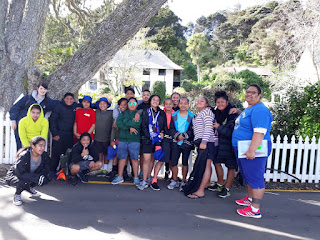Stepping Up
Like most new teachers, I tend to find school trips pretty stressful. I take frequent head counts of the children, have a bit of a korero beforehand about my expectations and how the day will run and I keep my tamariki close to me at all times. However, up until this point my school trips have been pretty simple to manage. I have often been accompanied by several other classes (and teachers) and I often only have to guide my students through an enclosed and controlled area, such as a museum or theatre.
That all changed this week as I escorted the year sevens from my class on a week long camp to the Bay of Islands. This camp would involve kayaking, spending the night in the bush and visiting numerous locations. The thought of this was pretty daunting and I even had a few nightmares in the week leading up to the camp! I was all too aware of the headlines about disasters that had occurred during school camps. I was also a little worried that my students would begin to forget some of the things that they had just learnt, such as the maths concepts I had taught during the previous weeks.
My students practicing their skit about Bush Survival
However, as soon as our first activity had begun I realized how wrong I had been to dread the camp - it was amazing! My students were able to learn so much about New Zealand history from the museums and tours that we attended. They had numerous new experiences and learnt skills such as bushcraft that they would remember for life. I saw so much value in every activity and had so much fun, when Friday came around I would have been happy to stay on (despite being exhausted)!
For one thing, I managed to include a lot of mini lessons over the course of the camp. As we spent time every day travelling around the Bay of Islands, I spent about 15 - 30 minutes over all each day to facilitate a mini maths lesson in the car. As my students are really enjoying the maths at the moment they actually began to ask for this on our journeys and we managed to work through the learning that I had left for our year sixes back at school. I also spent about 10 minutes with my group each day writing about the places that we had visited and putting them on a timeline. This supported them to build a conceptual framework around the topic and illustrated the connections between the places that we visited. After dinner we reflected on the experiences we had, set goals and filled in a PMIS chart about the activities.
I even got to go back over a water safety lesson that I taught in term one - we got in the huddle and HELP positions, skulled, treaded water and swam a distance.

Another really important aspect of the camp was that I developed really strong relationships with my learners and they got to know one another a lot better. All of my year sevens worked so well together and my group illustrated really effective and supportive teamwork. Some of my students who don't usually work together had the opportunity to do so and it was so lovely to hear them remark on this on our final night, stating what they did not know about the others in such a positive way.
One aspect of my teaching philosophy is that I seek to support my students to develop an understanding of themselves, their beliefs and their perspectives about different matters. I could definitely see my students learning new things about themselves on this camp,be it that they love kayaking, or that they discovered a new food that they like, or discovering deeper things, like how to help a friend in trouble, to be resilient or to try new things, even if they did not think that they would enjoy them.In particular I saw some of our Māori tamariki take more pride in their culture and using more of their language.
That all changed this week as I escorted the year sevens from my class on a week long camp to the Bay of Islands. This camp would involve kayaking, spending the night in the bush and visiting numerous locations. The thought of this was pretty daunting and I even had a few nightmares in the week leading up to the camp! I was all too aware of the headlines about disasters that had occurred during school camps. I was also a little worried that my students would begin to forget some of the things that they had just learnt, such as the maths concepts I had taught during the previous weeks.
However, as soon as our first activity had begun I realized how wrong I had been to dread the camp - it was amazing! My students were able to learn so much about New Zealand history from the museums and tours that we attended. They had numerous new experiences and learnt skills such as bushcraft that they would remember for life. I saw so much value in every activity and had so much fun, when Friday came around I would have been happy to stay on (despite being exhausted)!
 |
| A huge challenge for me was sleeping in the shelter we built |
I even got to go back over a water safety lesson that I taught in term one - we got in the huddle and HELP positions, skulled, treaded water and swam a distance.

Another really important aspect of the camp was that I developed really strong relationships with my learners and they got to know one another a lot better. All of my year sevens worked so well together and my group illustrated really effective and supportive teamwork. Some of my students who don't usually work together had the opportunity to do so and it was so lovely to hear them remark on this on our final night, stating what they did not know about the others in such a positive way.
One aspect of my teaching philosophy is that I seek to support my students to develop an understanding of themselves, their beliefs and their perspectives about different matters. I could definitely see my students learning new things about themselves on this camp,be it that they love kayaking, or that they discovered a new food that they like, or discovering deeper things, like how to help a friend in trouble, to be resilient or to try new things, even if they did not think that they would enjoy them.In particular I saw some of our Māori tamariki take more pride in their culture and using more of their language.
I am so glad to have had this experience and I know that I will draw upon my learning here for the many camps to come.



Well done Miss Stone! :)
ReplyDelete